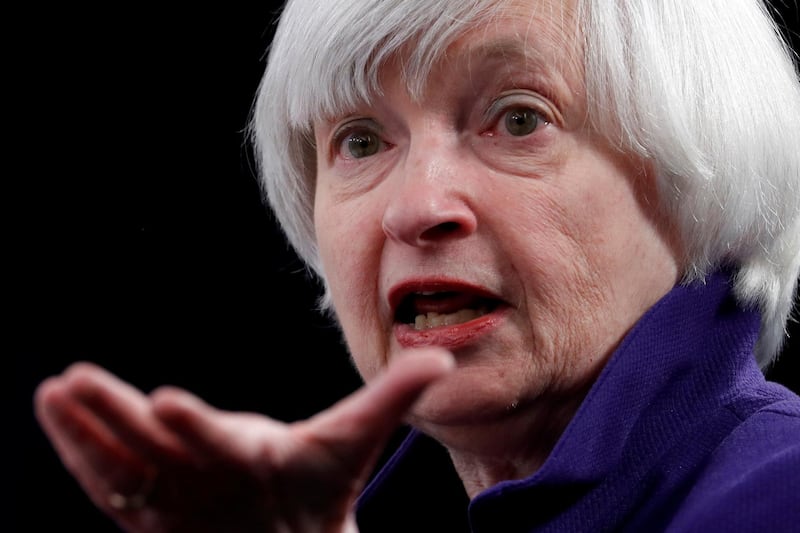The Central Bank of the UAE raised interest rates by 25 basis points on Thursday evening, minutes after the announcement of a similar rate rise by the US Federal Reserve, paving the way for higher borrowing costs in 2018.
The move was replicated by other central banks across the GCC, with the exception of Kuwait. Regional economies are bracing for three further interest rate rises in 2018 - as per guidance from Fed chair Janet Yellen - at a time when the region's economies may struggle with tighter monetary policies that are all but mandated by their currencies' peg to the US dollar.
"The Central Bank of the UAE announced that, effective Thursday, 14 December 2017, it will raise interest rates applied to the issuance of its Certificate of Deposits in line with the increase in interest rates on the US dollar, following the Federal Reserve Board's decision to increase the Federal Fund Rate by 25 basis points," the bank said in a statement posted on its web site on Wednesday evening.
The bank said that it raised the interest rate on the certificate of deposits by 25 basis points to 1.75 per cent. The UAE uses certificates of deposit as a monetary policy instrument through which rates are transmitted in the absence of an independent monetary policy.
"The interest rate increase will naturally translate to higher borrowing costs and affect the rate-sensitive sectors such as automobiles and real estate," said Emilio Pera, head of financial services at KPMG Lower Gulf.
"With the implementation of VAT scheduled for next month, it will be interesting to see how borrowers react to simultaneously rising costs. However, we believe that the local banks, which use their standard variables rates to price a new transaction, would have factored in some of the impact of the rate hike which was widely expected."
The Fed's bullish stance comes against a backdrop of positive sentiment on US and global economic growth. The US added 228,000 jobs in November despite the impact of Hurricanes Harvey and Irma, with stocks at record highs following the approval of Donald Trump's tax reform bill in the US Senate. The S&P 500 is on course for its best annual performance since 2013, having risen 19 per cent since the start of the year.
______
Read More:
[ Federal Reserve raises rates, eyes three 2018 hikes ]
______
The Saudi Arabian Monetary Authority said it would raise the reverse repo rate from 125 basis points to 150 basis points with immediate effect, while the central bank of Bahrain said its key policy interest rate on its one-week deposit facility was raised to 1.75 per cent from 1.50 per cent.
The Bahraini central bank also said it had increased the overnight deposit rate to 1.50 per cent from 1.25 per cent and adjusted both the one-month deposit rate to 2.4 per cent from 2.15 per cent and the lending rate to 3.5 per cent from 3.25 per cent.
However Kuwait's central bank kept its key interest rate unchanged, the second time in a row that it has not followed US monetary policy, in order "to consolidate an atmosphere conducive to the recovery of economic growth rates," its said in a statement.
Meanwhile, the Qatar Central Bank said it had amended its repo rate to 2.50 per cent from 2.25 per cent.
The central bank of Oman didn't announce any changes on its website but said its policy was to trail the movements of Federal Reserve Fund Rate.





